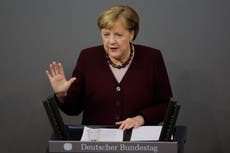Brexit: ‘Serious’ hit to UK economy from failure to reach trade deal with EU, warns OECD
Your support helps us to tell the story
From reproductive rights to climate change to Big Tech, The Independent is on the ground when the story is developing. Whether it's investigating the financials of Elon Musk's pro-Trump PAC or producing our latest documentary, 'The A Word', which shines a light on the American women fighting for reproductive rights, we know how important it is to parse out the facts from the messaging.
At such a critical moment in US history, we need reporters on the ground. Your donation allows us to keep sending journalists to speak to both sides of the story.
The Independent is trusted by Americans across the entire political spectrum. And unlike many other quality news outlets, we choose not to lock Americans out of our reporting and analysis with paywalls. We believe quality journalism should be available to everyone, paid for by those who can afford it.
Your support makes all the difference.A no-deal Brexit at the end of 2020 would deliver a “serious” short-term hit to the UK economy and produce a “strongly negative” effect on trade, productivity and jobs in the long term, the OECD has warned.
The Organisation for Economic Co-operation and Development said that disruption from failure to conclude a trade deal with the EU would come as the UK grapples with the impact of a second wave of coronavirus.
The international economic think tank downgraded its outlook for the UK economy, estimating an 11.2 per cent fall in GDP for 2020, followed by a slower-than-expected recovery, with growth of 4.2 per cent next year and 4.1 per cent in 2022.
With just 30 days to go to the UK leaving the EU’s single market and customs union, talks on a future relationship remain in stalemate over access to fishing stocks in British territorial waters and Brussels’ demand for a level playing field on standards.
The government’s official forecaster, the Office for Budget Responsibility, has projected a 2 percentage point reduction in GDP in 2021 if no deal is in place by 31 December.
In an assessment of the UK’s prospects contained in its six-monthly global Economic Outlook, the OECD said: “The failure to conclude a trade deal with the European Union by the end of 2020 would entail serious additional economic disturbances in the short term and have a strongly negative effect on trade, productivity and jobs in the longer term.
“By contrast, a closer trade relationship with the European Union than expected, notably encompassing services, would improve the economic outlook in the medium term.”
The OECD forecasts suggest the UK will suffer one of the biggest contractions in the G20 group of countries in 2020.
By contrast, the US economy is forecast to shrink by 3.7 per cent, Germany by 5.5 per cent and France by 9.1 per cent in a year when the global economy has been convulsed by the impact of Covid-19. China’s GDP is forecast to grow by 1.8 per cent.
The OECD’s most recent previous prediction saw a 10.1 per cent fall in UK GDP over 2020.
But the organisation identified a chink of light for the world economy, thanks to the recent positive developments on effective Covid-19 vaccines.
OECD chief economist Laurence Boone said: “For the first time since the pandemic began, there is now hope for a brighter future.
“Progress with vaccines and treatment have lifted expectations and uncertainty has receded.”
But she added that the “road ahead is brighter but challenging”, with the recovery set to be uneven across the globe and the potential for a “severe” hit if vaccines prove ineffective in controlling the pandemic.
She said: “The current resurgence of the virus in many places reminds us that governments may be forced again to tighten restrictions on economic activity, especially if the distribution of effective vaccines progresses slowly.
“And confidence would take a hit if vaccine distribution or secondary effects proved disappointing.
“The toll on the economy could be severe, in turn raising the risk of financial turmoil from fragile sovereigns and corporates, with global spillovers.”
The OECD is forecasting global GDP to fall 4.2 per cent in 2020 before rising 4.2 per cent in 2021 and 3.7 per cent in 2022.





Join our commenting forum
Join thought-provoking conversations, follow other Independent readers and see their replies
Comments